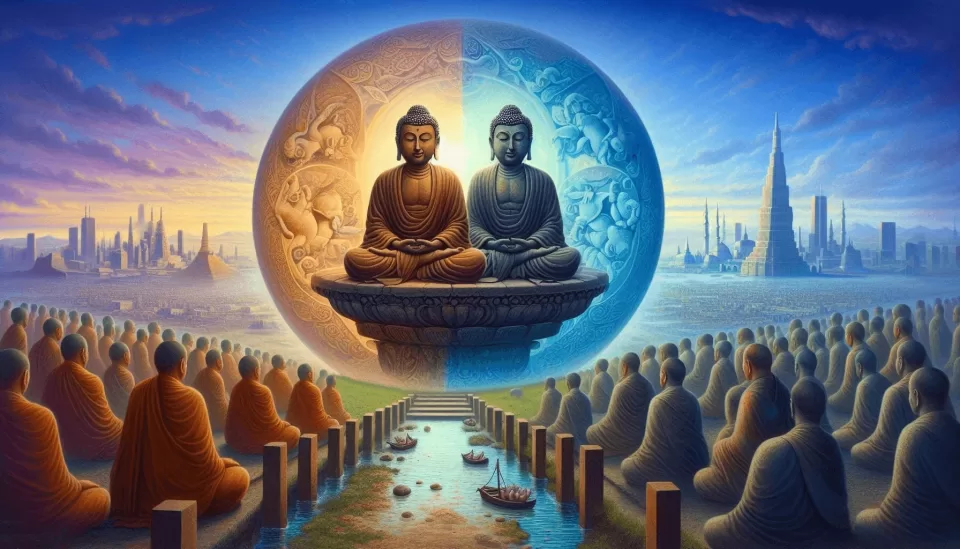Introduction
Have you ever felt frustrated by the divisiveness of politics? Do you yearn for a path that transcends the ego-driven clashes that dominate our headlines? Zen philosophy, with its emphasis on present-moment awareness and letting go of ego, offers a unique perspective on this age-old struggle. While Zen itself may not prescribe specific political actions, it provides a foundation for inner transformation that can have profound ripple effects on the world around us. In this article, we’ll explore the inherent tension between true religion and political ambition, how Zen philosophy sheds light on this dynamic, and how cultivating inner peace can lead to a more compassionate and mindful approach to navigating the world.
Religion vs. Politics: A Fundamental Conflict
Religion, at its core, is a search for meaning and connection beyond the self. It often involves cultivating qualities like compassion, selflessness, and living in harmony with something larger than ourselves. Politics, on the other hand, can often be a realm of ambition, power struggles, and winning at all costs. These seemingly opposing forces create a fundamental tension.
The Poison of Ego in Politics
Imagine politics as a game of chess. Players strategize, plan moves, and strive for dominance. This drive for power is often fueled by ego, a sense of separation and the need to feel superior. As the quote goes, “power corrupts, and absolute power corrupts absolutely.” When ego takes center stage, collaboration and compromise become casualties, replaced by self-interest and manipulation.
The Blind Ambition of the Ego Trip
The political arena can be a breeding ground for an “ego trip,” a pursuit of power and recognition for the sake of self-gratification. This insatiable hunger for more can lead to policies that prioritize winning over serving the greater good. Think of a politician more concerned with re-election than addressing the needs of their constituents.
Zen: A Path of Inner Peace and Non-Duality
Zen Buddhism, a branch of Mahayana Buddhism, emphasizes the practice of mindfulness and meditation as a path to enlightenment. Central to Zen is the concept of “non-duality,” the realization that the self and the world are not separate entities. This understanding fosters compassion and a sense of interconnectedness.
Letting Go of Ego Through Meditation
Through meditation practices like zazen (seated meditation) and koan study (contemplation of paradoxical questions), Zen practitioners cultivate awareness of their thoughts and emotions. This allows them to observe the ego’s machinations and gradually loosen its grip. By letting go of the need for control and self-importance, individuals can move towards a more mindful and peaceful state of being.
From Individual Transformation to Societal Change
While Zen may not advocate for specific political reforms, the inner transformation it encourages can have a profound impact on the world around us. As individuals cultivate compassion, empathy, and a sense of interconnectedness, their interactions with others become more mindful and collaborative. This ripple effect can create a more peaceful and cooperative society.
The Paradox of Religion in the Political Sphere
The quote raises an interesting question: can a religion truly be religious if it becomes entangled with politics? History offers us examples of religious institutions wielding political power, sometimes for good, sometimes for ill.
The Duality of Religious Institutions
Many established religions have a complex relationship with politics. They may offer moral guidance and social services, but they can also become caught up in power struggles and political agendas. This duality highlights the constant tension between the spiritual ideals at the heart of religion and the realities of the political world.
The Power of the Individual: Buddha vs. Buddhism
The quote distinguishes between the founder of a religion and the institution it becomes. The Buddha, Jesus, or other founders embodied spiritual principles. However, the organizations that sprout around their teachings can become politicized over time. This distinction highlights the importance of individual practice and the potential pitfalls of organized religion.
Embracing Non-Duality: A New Approach to Politics
So, does this mean we should abandon politics altogether? Not necessarily. Zen philosophy encourages us to engage with the world in a mindful way. Imagine a politician who, rooted in a sense of non-duality, approaches political decisions with the well-being of all in mind. They would prioritize collaboration, seek win-win solutions, and lead with compassion.
Cultivating Mindfulness in the Political Sphere
Bringing Zen principles into the political realm may not seem practical, yet it offers a transformative potential. Imagine politicians practicing mindfulness meditation to cultivate inner peace before crucial debates

